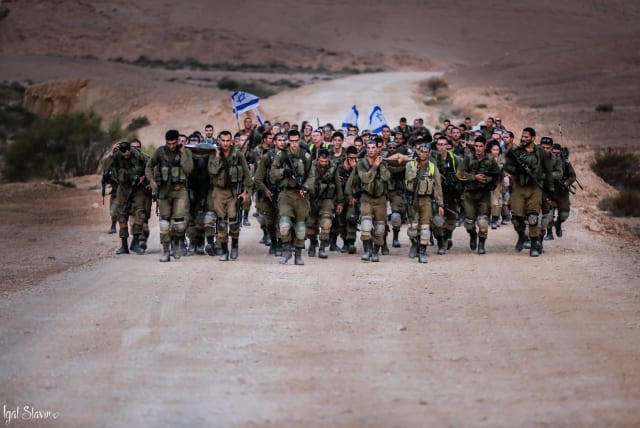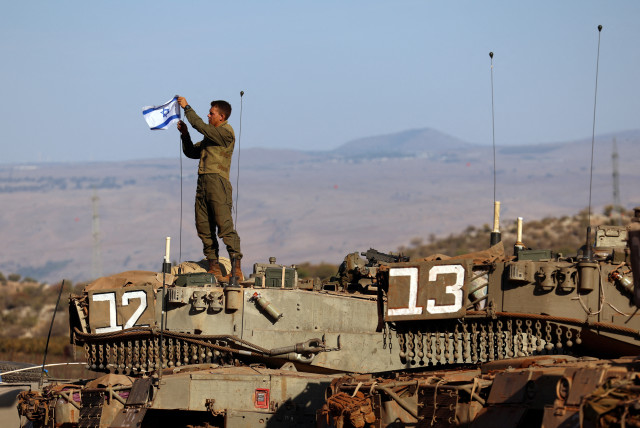The Gaza war should set a new tone for Israeli unity going forward - opinion

This cursed war may be a wake-up call. It may propel Israelis to commit to a process that sets the limits for our internal disputes.
The memory and repercussions of the war we are still in the midst of will accompany us all for the rest of our lives. Too many people will walk the world burned by the fiery loss of a loved one – a father, a child, a wife, a soulmate – whose memory will never fade from consciousness. Others will bear the scars of the war – physically or emotionally wounded. The Israeli public will never forget that terrible day – October 7, 2023.
The magnitude and meaning of this war are not reflected in the perfunctory name an IDF computer generated for it: “Swords of Iron.” A name so generic it could fit any violent conflict, anywhere and anytime. A name better suited to a video game or Texas gun shop than the current earthquake shaking our existence. A name that holds no emotional charge, does not inspire action, and does not strike a uniquely Israeli or Jewish chord.
It is tone deaf to the harsh reality Israelis wake up to in the dark winter mornings of 2023.
The war should be referred to as the "Genesis War"
Therefore, back when the war was in its second week, I proposed in these very pages that it be called the Genesis War. This choice harkens back to the day the war broke out – Simchat Torah, when we restart the yearly Torah cycle and read from the book of Genesis – “In the beginning God created.” But more importantly, it signifies that this war is not just another point on the Israeli timeline, but a crossroads: an event that differentiates between what came before the war and what will come after it. A watershed that distinguishes between the divided and torn Israel, on the brink of civil war, as it was on October 6, and the Israel that mobilized under the banner of “togetherness.”
Two previous Israeli kingdoms – the Kingdom of David and Solomon and the Hasmonean Dynasty – did not survive their eighth decade, and over the past year there was a creeping sense that a similar fate was in store for the State of Israel. The amazing Zionist success story of building a national home for the Jewish people was beginning to show signs of decline: an identity crisis that turned into a political crisis, and then a struggle for control embodied in an attempt at regime change that led us to the brink of civil war. The ancient curse “Brothers will snatch each other by the hand and attack one another” became a real and chilling possibility.
Basic assumptions – that we are a democracy committed to the rule of law, that we share a covenant of fate, that in the spirit of statehood Israel was built and grew as a common framework for all identity groups – were called into question. Ugly idols desecrated the Zionist temple.
The war came and forced us to rethink our collective self. It does not camouflage the ideological disagreements between us; Israeli identity groups will continue their wrestling after the fighting stops. But this cursed war may be a wake-up call. It may propel Israelis to commit to a process that sets the limits for our internal disputes.
The spectacular mobilization of all segments of society, the unity of action in every corner of Israel, was indeed forced upon us by those who rose up to kill us. But this unity of mission and deed must once again become – as it was in Israel’s first 50 years – an irreducible element of our national identity. This is how we will test ourselves. This is how our leaders will be tested. Our future depends on this.
The Genesis War will be worthy of its name if the sacrifice of the fallen, the pain of the wounded, the terror of the abducted, the suffering of the hundreds of thousands of families of the soldiers and the evacuees are translated into a new beginning. It will be a social movement that changes our consciousness – we are one nation – and therefore also changes reality.
The Israeli restart must be supported by a series of measures that will stabilize the covenant of fate between all of us. These include: the anchoring of democracy in a broad consensus over the rules of the game for managing disputes between brothers in future generations (a “thin constitution”); striving to design a renewed social contract; stabilizing the political system in a way that grants the Israeli majority its rightful place at the forefront while reducing its dependence on the ideological extremes; revitalizing the centrality and importance of Israeli public service while freeing it from mediocrity and corruption; enlisting new forces, the good sons and daughters of Israel from all its tribes, to all the avenues of national leadership.
The war for the Israeli homeland will not end with the conquest of Gaza. It will only commence – from the beginning, from Genesis – when we return to everyday civilian life. Those who are today bravely risking their lives on the battlefield must bring home with them, at the end of the war, the spirit pulsating within them in Gaza. The Golani determination, the camaraderie among the tank crews, the precision of the air crews, were set in motion by the powerful and chaotic action of the morning of Simchat Torah, by the military emergency call-up order. When it expires, Israel’s future will depend on whether we also issue a civilian emergency call-up for ourselves. Will we know how to translate the Israeli unity in defending the borders into Israeli “togetherness” in defending what is within them – our home?
Civil society’s commitment to a renewed beginning of the Zionist enterprise will be carved on the tombstones of the hundreds who made the ultimate sacrifice in battle and will read: “Fell in the Genesis War.”
The writer is president of the Jewish People Policy Institute (JPPI) and a professor emeritus of law at Bar-Ilan University.
Jerusalem Post Store
`; document.getElementById("linkPremium").innerHTML = cont; var divWithLink = document.getElementById("premium-link"); if (divWithLink !== null && divWithLink !== 'undefined') { divWithLink.style.border = "solid 1px #cb0f3e"; divWithLink.style.textAlign = "center"; divWithLink.style.marginBottom = "15px"; divWithLink.style.marginTop = "15px"; divWithLink.style.width = "100%"; divWithLink.style.backgroundColor = "#122952"; divWithLink.style.color = "#ffffff"; divWithLink.style.lineHeight = "1.5"; } } (function (v, i) { });

